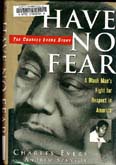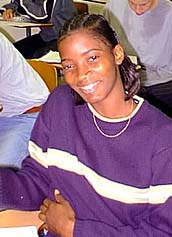Major Works
- Have No Fear: The Charles Evers Story (1996) with Andrew Szanton
- Evers (autobiography) 1971 with Andrew Szanton
Biography of Charles Evers
by Martesa Bishop (SHS)
Charles Evers, civil rights leader and former mayor, was born in Decatur, Mississippi, in 1922. His parents were Jim Evers and Jessie Wright. In his early years he lived by his father’s creed: have no fear. After graduating from high school, Evers attended Alcorn State University. He soon joined the United States Army during the Korean Conflict, took over his family’s funeral parlor business, and moved to Chicago (1957). In Chicago he became a successful nightclub owner, a disc jockey, and a real estate agent. He was always supportive of his brother, Medgar Evers, and his involvement with the National Association for the Advancement of Colored People also known as the N.A.A.C.P. (www.historychannel.com). He sent Medgar money to support the organization, made daily calls checking on him, and he visited him as often as possible.
He returned to Mississippi after Medgar’s brutal assassination in 1963. He stepped into Medgar’s shoes as field director of the N.A.A.C.P. in Mississippi. He decided to run for mayor of Fayette, Mississippi, in 1969. According to one source, “He was the first black mayor elected in a racially-mixed Southern town since the Reconstruction.” In 1971, he published his first book, his autobiography Evers. He was elected mayor again in 1973. In 1978 he lost his bid to become a U.S. senator. His volatile personality alienated many but inspired more. Elected the first black mayor in Mississippi since Reconstruction, he made a courageous run for governor on the campaign promise “Evers for Everybody.” In 1989, he decided to become a Republican. He wrote another autobiography, Have No Fear, which was published in 1999.
Reviews
A Review of Have No Fear
by Martesa Bishop (SHS)
Have No Fear by Charles Evers and Andrew Szanton is about growing up in a segregated state. It tells the about the hardships that many blacks had to face in Mississippi. Evers discusses the “many obstacles and hardships, the cruelty of racism and bigotry that many people had to face because of the ignorant leaders (Evers interview).” Evers says that he decided to write about himself and Medgar as the subject of his book because he thinks that the only person who could tell the story of their experiences would be they themselves. He wanted to tell what it was like for black people. The book tells of blacks that were killed for trivial reasons. Emmett Till, who came from Chicago, was brutally assassinated because he commented on a Caucasian woman. When Charles and Medgar were young, they had to walk to school. White buses would pass along and try to get them dirty. When they did get to school, rain would fall into the classroom, or there would be so many kids in the classrooms that others would not be able to concentrate. The Ku Klux Klan would always do things to bring the black race of people down. Any black person who thought they were uppity would be brought down.
Charles Evers always wanted to succeed, and he would stop at nothing to do it. Evers knew that death was in his footsteps as a child. He would do things that anybody could have been hung for, though he trusted in God, who protected him. Though he was not a whiz in school, he has managed to become very successful. Driven from Mississippi, he made an illicit fortune in Chicago, and sent the money home to help his brother in the fight for Civil Rights. Shattered by Medgar’s assassination in 1963, Charles seized his brother’s mantle and became head of the Mississippi N.A.A.C.P. (Have No Fear). When he and Medgar were growing up, they made a pact: Whatever one would do, the other would follow. After Medgar’s assassination, Charles Evers succeeded him. He was now field director of the N.A.A.C.P. He felt that he could not go on after Medgar’s death, though friends like John F. Kennedy and Bobby Kennedy helped him through it. He helped campaign for the Kennedy family, and he got to know them very well.
The provocative story this book tells is very interesting. I strongly advise you to read it. If you would like to know more about the African American people, it will be appealing. To the new generation– you should read it. You will learn about how African American people before us suffered hardships and what it was like to be a colored person then. The experiences Evers describes in the book seem very real as you read this true story.
Interview with Charles Evers 1998
by Martesa Bishop (SHS)
Who is your favorite author?
Charles Evers!!
What author do you think has influenced you the most?
Richard Wright. I knew him back in the years when he was writing.
Why did you decide to write about yourself and Medgar as the subject of you book Have No Fear?
There were times when people had a lot of opinions about us. The best person there to tell about themselves would be the person himself or herself. I knew Medgar and I the best . So that’s why I decided to do it. To tell the whole story, the true story of what it was like to grow up in Mississippi, in fact when we grew up.
When did you become interested in writing?
I wrote my first book, my autobiography, in 1970, maybe ’70, ’71. Then I wrote the last one, Have No Fear, I guess in the ’80’s.
Was there something in particular that got you interested in writing?
No. No more than I wanted people to read what it was like for black folks in particular during the years that we came up. Many obstacles and hardships, the cruelty of racism and bigotry that many people suffered from because of the ignorant (leaders). I wanted it to be put in writing, so the
people can have something, maybe young people like you, to know about, to read about, to find out about in the years to come.
What kind of student were you in high school?
Oh, I was naughty. That’s about all I can tell you. I was never an “A” and “B” student. I was just an average student through college. I made a “C” or maybe a “C+.”
How long did it take you to write Have No Fear?
A couple of years. I would do things on tapes; then I would also sit down and have sessions with him (Andrew Szanton). He put it in good dictionary form.
Are you working on a new book right now?
No. No.
Have you received many awards in your lifetime?
Quite a few. Quite a few.
Do you have any advice for future writers?
I think that my advice would be to focus on telling the truth. Let your writing be truthful and not fiction. Give it your best attention and the best grammar you possibly can. Make it as simple as possible so that any person could understand it.
Do you have any advice for students today?
Stay in school. Stay off drugs. Young ladies, don’t get pregnant. And you can be the best that you want to be, if you just put that pride in yourself and want to be. You can be anything that anyone else has been if you want it very badly. You have to work hard, stay in school, don’t get on drugs, and ladies, please don’t get pregnant.
How has Mississippi or living in Mississippi influenced your writing?
I don’t really trust my writing, no more than it’s my life. The lack of most faithful day Negroes, colored folks, blacks, and so that young people, like you and others have come along, whether black or white.
Related Websites
- Wikipedia biography of Charles Evers
- Clarion Ledger article on death of Charles Evers at age 97
- PBS Jim Crow Stories: Charles Evers
- Black Past.org: James Charles Evers
- Charles Evers biography on Princeton website
- Mississippi Blues Trail marker Charles Evers
Bibliography
- The Civil Rights Act of 1964: Text, Analysis, Legislative History. Washington, D.C.: BNA Incorporated, 1964.
- Evers, Charles. Interview by Martesa Bishop. November 23, 1998.
- Evers, Charles. (1997). Have No Fear. New York: J. Wiley & Sons.
- Evers, Charles. Evers. Edited and with an introduction by Grace Halsell. New York adn Cleveland: World Publishing Company, 1971.
- http://search.biography.com/print_record.pl


